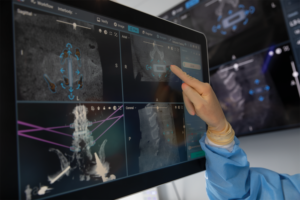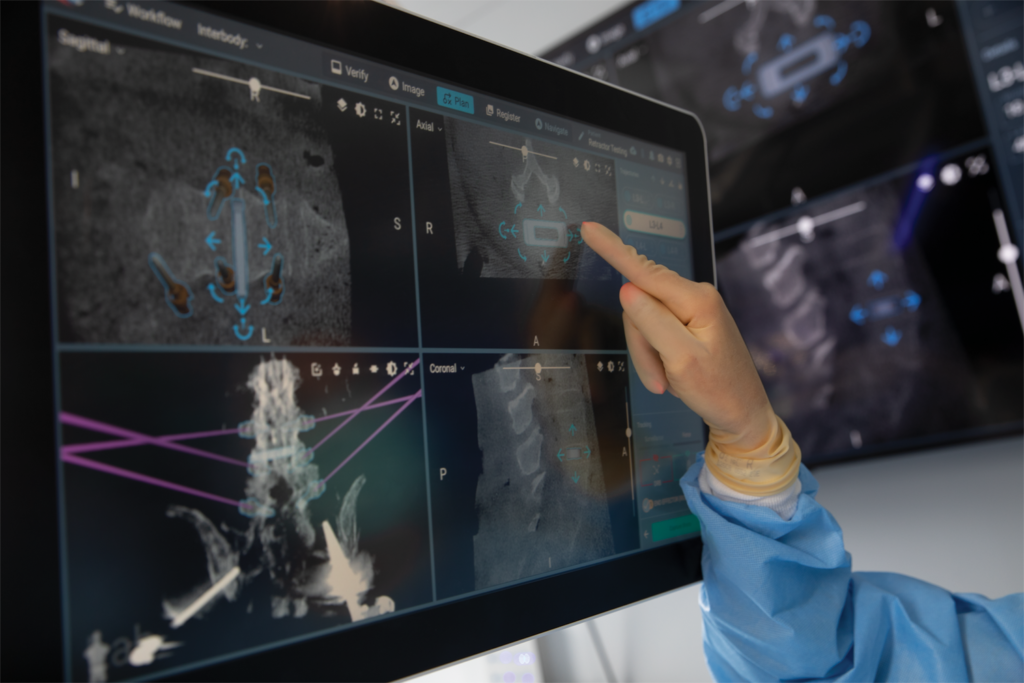Building a Strong Spine Program with ExcelsiusGPS®

- March 4, 2022
- Posted in Excelsius® Technology
Developing a strong spine program requires a clear vision for where spine care is headed. This means having a solid understanding of what patients want, while also providing a surgical solution that is easy, efficient, safe, and valuable for the hospital and the surgeon.
With patients now educating themselves about minimally invasive surgery (MIS), healthcare organizations must go above and beyond to provide the best patient care for a successful spine program.
One way to accomplish this is by providing more MIS options to patients through robot-assisted surgery.
Growing with Technology
Globus Medical’s ExcelsiusGPS®, the world’s first revolutionary robotic navigation platform, leverages surgeon experience to enhance patient care and improve intraoperative efficiency.
With ExcelsiusGPS®, less invasive, innovative surgical solutions are well within reach for any hospital. In less than a year after the launch of their ExcelsiusGPS® program, Methodist Stone Oak Hospital in San Antonio, Texas started to see the impact of this technology. Gabriel Marrufo, CFO, says, “This technology allows us to perform procedures that we were never able to do before, specifically because of the accuracy and the results we can get time after time.” Methodist Stone Oak Hospital launched the third ExcelsiusGPS® program in the world back in 2017.
The expansion of robotic technology in the OR has also greatly impacted hospitals that launched robotic surgery programs by eliciting additional cases and driving accurate implant placement for MIS procedures.1
“It is clear from our install base that [established] facilities are outgrowing other facilities with respect to spinal fusion surgeries and providing consistent results to their patients,” asserted Mike Kaiser, a Globus Medical Regional Sales Manager.
This growth is especially evident in Idaho, where Northwest Specialty Hospital became the first privately owned hospital in the United States to own two ExcelsiusGPS® robots.
Program Success in Idaho

Northwest is a nationally recognized surgical observation site for robotic spine procedures, providing education and training for surgeons on advanced techniques with surgical robotic navigation. “We are honored to be nationally recognized as experts and leaders in the field of surgical robotic navigation platforms for the spine,” states Dr. Roland Kent, orthopedic surgeon and co-founder of Axis Spine Center.
Rick Rasmussen, CEO of Northwest Specialty Hospital, added, “We have one of the best spine programs in the US. Our dedication to developing the spine program at Northwest through the use of an advanced spinal robotic navigation system and experienced surgeons exemplifies our commitment to superior patient care.”
“You have to have the desire to continually improve,” explains Nick Mason, a Spine Territory Manager for Globus Medical. “Dr. Kent has done hundreds of cases [with ExcelsiusGPS®], but he still wants to be better and continue to advance his practice by using the system to do surgery in new and better ways. For Dr. Kent, his vision is always geared to the future of spine care rather than the past. And hospitals that want to have a successful spine program should recognize that.”

1 Sheetz KH, Claflin J, Dimick JB. Trends in the adoption of robotic surgery for common surgical procedures. JAMA Netw Open. 2020;3(1):e1918911. doi:10.1001/jamanetworkopen.2019.18911
